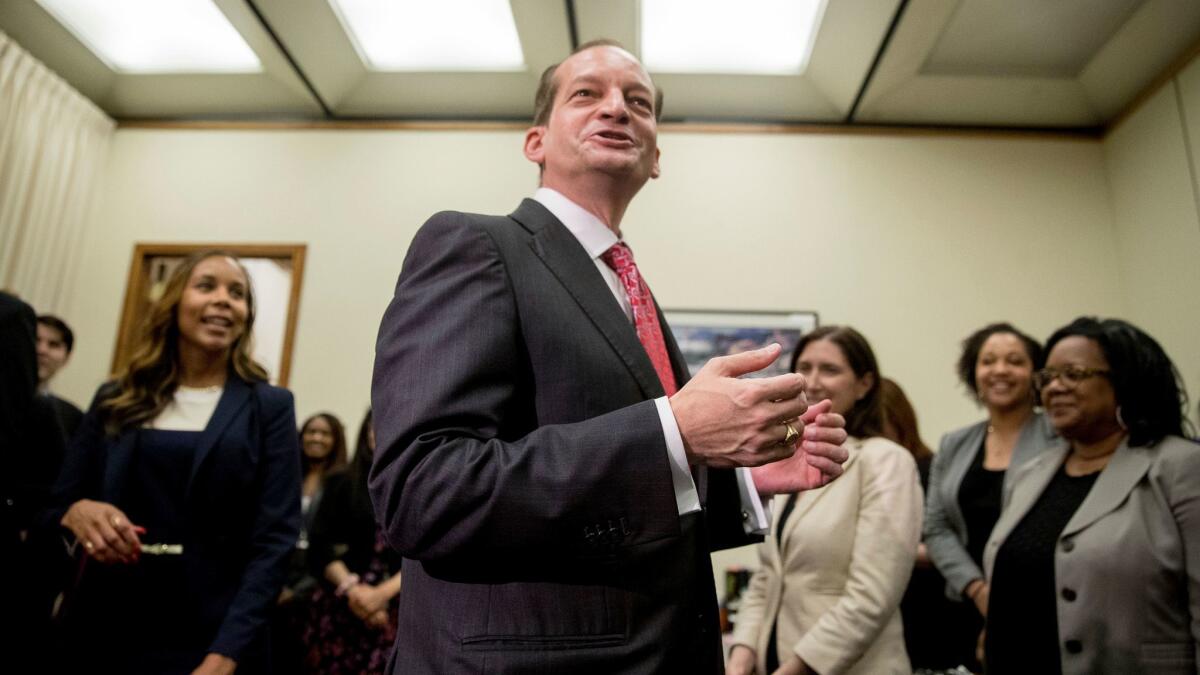Retirement advisor rule will go into partial effect, but changes are still possible

Washington — A controversial Obama-era rule for retirement advisors, delayed by a review ordered by President Trump because of strong Republican and financial industry opposition, will partially take effect next month, Labor Secretary Alexander Acosta said.
But Acosta indicated that he has problems with the rule and that there still could be changes or a repeal before all of its provisions kick in next year.
The regulation, known as the fiduciary rule, requires investment brokers who handle retirement funds to put their clients’ interests ahead their own compensation, company profits or other factors.
The Obama administration said those conflicts of interest cost consumers $17 billion a year as they are steered toward IRAs and other retirement investments with higher fees or lower returns.
Acosta’s decision “is a win for retirement savers, but it’s the battle that’s been won and not the war,” said Barbara Roper, director of investor protection at the Consumer Federation of America, which supports the rule’s full implementation.
“Industry has made clear they will not be satisfied until they’ve seen this rule gutted, and that fight goes on,” she said.
Opponents, including key players in the financial industry and most Republicans, complained that the rule would increase the cost of investments by forcing asset management firms to spend money on implementation and make it more difficult for average Americans to get retirement advice.
The Republican-controlled Congress voted last year to overturn the rule, but Obama vetoed the measure.
Acosta echoed concerns of opponents in an opinion article for the Wall Street Journal posted Monday night, saying the rule “as written may not align with President Trump’s deregulatory goals,” Acosta said.
“This administration presumes that Americans can be trusted to decide for themselves what is best for them,” Acosta wrote. “Certainly, it is important to ensure that savers and retirees receive prudent investment advice, but doing so in a way that limits choice and benefits lawyers is not what this administration envisions.”
Trump ordered a review of the rule on Feb. 3, with White House Press Secretary Sean Spicer calling it “regulatory overreach” by the Labor Department.
Parts of the rule were supposed to take effect April 10, but the Labor Department delayed that for 60 days to conduct the review.
Noting that some opponents of the rule have called for a continued delay, Acosta said his review of the Administrative Procedure Act has “found no principled legal basis” to do so.
“Respect for the rule of law leads us to the conclusion that this date cannot be postponed,” Acosta wrote in the Wall Street Journal opinion article.
“The Labor Department will roll back regulations that harm American workers and families,” he said. “We will do so while respecting the principles and institutions that make America strong.”
Some provisions will go into effect June 9, including the requirement that financial advisors act in the best interest of their clients. But a key component of the regulation, that firms accepting commissions put the provisions into customer contracts, will not take effect until Jan. 1.
So while retirement advisors will be required to act in their customers’ best interest, that policy is largely unenforceable until the contract provisions are in place.
The contract allows customers to pursue class-action litigation even if they’ve signed an arbitration agreement. Jaret Seiberg, an analyst with brokerage and investment bank Cowen & Co., said in a research note that he expects a delay in implementing that part of the rule of as long as a year and believes the Labor Department ultimately will propose eliminating the ability of customers to file class-action suits.
In formal guidance issued Monday, the Labor Department said it would “not pursue claims” against advisors who work “diligently and in good faith” to comply with the rule until it fully takes effect Jan. 1.
Acosta, a former Justice Department official who took office on April 28, said he is seeking additional public input.
Kenneth E. Bentsen Jr., president of the Securities Industry and Financial Markets Assn., a trade group that opposes the fiduciary rule, said he was pleased with the decision to continue assessing its potential effects.
“While we are disappointed that the Department of Labor has chosen not to further delay the rule until the department has completed a review of the entire rule’s impact on investors, we appreciate Secretary Acosta’s recognition of the rule’s negative impact and his desire to seek public input,” Bentsen said.
Bentsen said he hoped that the review will conclude that “dramatic and fundamental changes” to the rule are needed.
Neil Bradley, chief policy officer for the U.S. Chamber of Commerce, another fiduciary rule opponent, said the business trade group would “continue to pursue all available options” to stop the rule. The Chamber, SIFMA and other industry groups sued last year to stop the rule, but a Texas judge dismissed the suit. They are appealing.
“The fiduciary rule presents real harm to Main Street investors and retirement savers, and a delay would have provided a helpful period of relief for those already feeling the weight of its implementation,” Bradley said.
But Consumers Union urged the Labor Department to “resist industry-led efforts to diminish or weaken the rule and the important protections it provides.”
Roper said she was concerned that Acosta was “parroting industry propaganda” about the need for the rule.
“Anyone who knows anything about investor sophistication knows that the idea that investors can tell whether they’re getting good advice is nonsense. That is a fantasy,” she said. “We need a legally enforceable standard that requires real mitigation of conflicts and not just sort of lip-service to customer best interest.”
Twitter: @JimPuzzanghera
UPDATES:
11:35 a.m.: This article was updated with comment from the U.S. Chamber of Commerce and Consumers Union.
11:10 a.m.: This article was updated with additional details and comments from Barbara Roper of the Consumer Federation of American and Kenneth Bentsen of the Securities Industry and Financial Markets Assn.
This article was originally published at 5:50 a.m.
More to Read
Inside the business of entertainment
The Wide Shot brings you news, analysis and insights on everything from streaming wars to production — and what it all means for the future.
You may occasionally receive promotional content from the Los Angeles Times.











